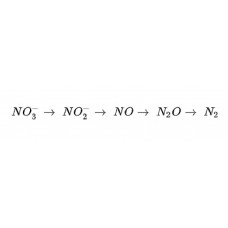Denitrification - microbial reduction of nitrates and nitrites to nitrogen, sometimes nitrous oxide, rarely nitric oxide.
The sum of the microbiological processes of reducing nitrates to nitrites and then to gaseous oxides and molecular nitrogen. As a result, their nitrogen returns to the atmosphere and becomes inaccessible to most organisms. It is carried out by prokaryotes (both bacteria and archaea) and eukaryotes under anaerobic conditions and is associated with their energy production.
The assimilative reduction of nitrate, which leads to the synthesis of nitrogen-containing cellular components and is characteristic of all plants, many fungi, and prokaryotes capable of growing in media containing nitrates, but not accompanied by energy production by these organisms, is particularly distinguished. Ammonium and nitrate nitrogen absorbed by microbial cells is incorporated into organic nitrogen-containing polymers of cell components and temporarily removed from the nitrogen cycle, i.e., it is immobilized.
Denitrification, which takes place mainly in the soil, produces up to 70-80% of N2O (nitrous oxide, a greenhouse gas) emissions into the atmosphere.
Denitrification
Tags: denitrification

